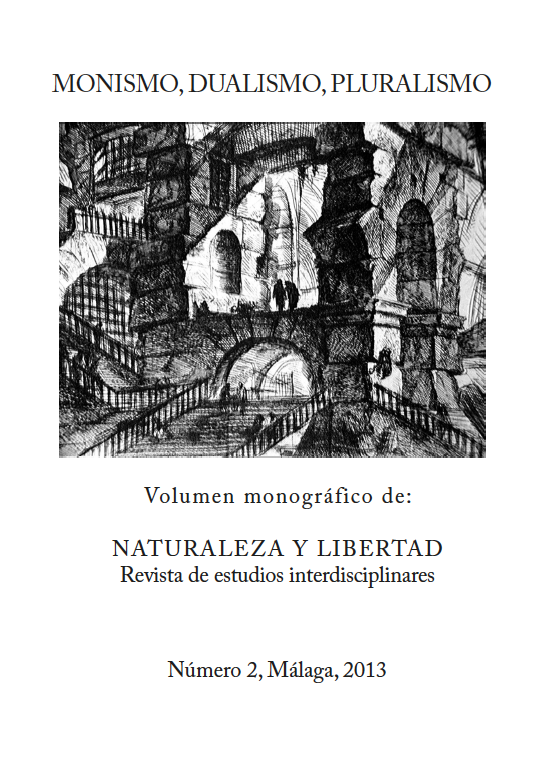La exigencia de principios constitutivos de la realidad. La solución de Kant al “amor no correspondido” de la modernidad
DOI:
https://doi.org/10.24310/nyl.v2i1.3988Keywords:
Principios constitutivos, Kant, trascendental, objetividad, sistema,Abstract
Resumen: El objetivo principal de este trabajo es proponer una justificación de la exigencia objetiva y subjetiva de principios constitutivos de la realidad, que es el germen de todo monismo, dualismo o pluralismo. La exigencia objetiva determina la formulación kantiana de lo trascendental y su vigencia en la filosofía contemporánea. Siguiendo a Kant, se muestra cómo las visiones totalizadoras y reduccionistas de la realidad (monismo, dualismo) responden a una exigencia meramente subjetiva.
Palabras clave: Principios constitutivos, Kant, trascendental, objetividad, sistema,
Abstract: The main objective of this paper is to propose a justification of the objective and subjective requirements of constitutive principles of reality, which is the origin of all monism, dualism or pluralism. The objective requirement determines the Kantian’s formulation of transcendental and its relevance in contemporary philosophy. Following Kant the article shows how totalizing and reductionist visions of reality (monism, dualism) respond to a demand merely subjective.
Keywords: Constitutive principles, Kant, transcendental, objectivity, system
Recibido: 30/01/2013 Aprobado: 18/04/2013
Downloads
Metrics
References
AUBENQUE, Pierre, ¿Hay que desconstruir la metafísica? Ed. Encuentro, Madrid, 2012.
ARISTÓTELES, Metafísica, Ed. trilingüe de Valentín García Yebra, Gredos, Madrid, 19822
BLANCHOT, Maurice, L’entretien infini, Gallimard, Paris, 1969.
FLAMARIQUE, Lourdes, “Filosofía trascendental, justificación de la filosofía y legitimidad del conocimiento”, en Reflexiones en Filosofía contemporánea, (Alfredo Rocha de la Torre, Ed.). Grama Ediciones, Buenos Aires, 2012, 207-234.
GILSON, Etienne, L’être et l’essence, Paris, Vrin, 1948.
KANT, Inmanuel, Kritik der reinen Vernuft, AA III, IV, Berlin, Walter de Gruyter, 1911.
KANT, Inmanuel, Opus Postumum, AA XXI, Berlin, Walter de Gruyter, 1936.
KANT, Inmanuel, Prolegomena, AA IV, Berlin, Walter de Gruyter, 1911.
KANT, Inmanuel, Was heisst, Sich im Denken orientiren?, AA VIII, Berlin, Walter de Gruyter, 1923. (¿Qué significa orientarse en el pensamiento? Trad. de R. Rovira. Facultad de Filosofía de la Universidad Complutense, Madrid, 1995).
LESSING, Gottlob Ephrain, Duplik, Werke 8. C. Hanser Verlag, München, 1979,
LLANO, Alejandro, Caminos de la filosofía. Entrevista con Lourdes Flamarique, Marcela García y José María Torralba. Pamplona, Eunsa, 2011.
LLANO, Alejandro, Metafísica y lenguaje, Pamplona, Eunsa, 20113.
MARTÍNEZ ACUÑA, M. Elvira, La articulación de los principios en el sistema crítica kantiano, concordancia y finalidad, Pamplona, Eunsa, 1996.
MCDOWELL, John, Mente y mundo, Salamanca, Ed. Sígueme, 2003.
NEIMAN, Susan, The Unity of reason. Rereading Kant, New York, Oxford University Press, 1994.
NIETZSCHE, Friedrich, Morgenröte, Sammtliche Werke, 3, München, Deutscher Taschenbuch, 1988.
PIPPIN, Robert, The Persistence of Subjectivity. On the Kantian Aftermath, Cambridge, Cambridge University Press, 2005.
WITTGENSTEIN, Ludwig, Tractatus Logico-philosophicus, Madrid, Alianza Ed., 2003.
Downloads
Published
How to Cite
Issue
Section
License
Those authors who have publications with this journal, accept the following terms:
1. Copyright and licensing information are clearly described on the journal’s web site: all content published in Naturaleza y Libertad is open acces without limit, and are subject to the Attribution-NonCommercial-ShareAlike 4.0 International (CC BY-NC-SA 4.0) license. The full text of which can be consulted at https://creativecommons.org/licenses/by-nc-sa/4.0/
2. It is the responsibility of the authors to obtain the necessary permissions for the images that are subject to copyright. The authors whose contributions are accepted for publication in this journal will retain the non-exclusive right to use their contributions for academic, research and educational purposes, including self-archiving or deposit in open access repositories of any kind. The electronic edition of this magazine is edited by the Editorial de la University of Malaga (UmaEditorial), being necessary to cite the origin in any partial or total reproduction.
3. This journal allows and encourages authors to publish papers on their personal websites or in institutional repositories, both before and after their publication in this journal, as long as they provide bibliographic information that accredits, if applicable, your posting on it.
4. In no case will anonymous papers be published.





18.png)













